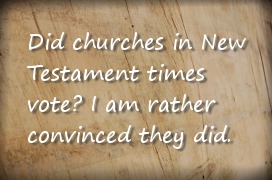Atonement Wars, Part 2
 Republished with permission. Originally appeared in Think on These Things, (Dec.-Jan 2010-2011)
Republished with permission. Originally appeared in Think on These Things, (Dec.-Jan 2010-2011)
In Part one of “The Atonement Wars” a number of atonement theories having found favor at various points in church history were explained. These included the moral influence theory, Christus Victor and the Ransom to Satan theory. While I reject the last of these theories, the other two have biblical backing and thus fill out our understanding of why Christ went to the cross. However, I believe the central teaching of Scripture in regard to Christ’s cross-work is best defined as the Penal Substitutionary Atonement (PSA). It is PSA that is facing resistance from many who would be happy to embrace the cross as a moral example of love or a victory over the forces of evil. Yet the Bible teaches that while Christ’s death was a great example and resulted in the defeat of evil forces, more importantly His death was necessary in order that our sins might be forgiven and we be reconciled to God.
Definitions and Challenges:
Wayne Grudem provides this helpful definition,
Christ’s death was ‘penal’ in that he bore a penalty when he died. His death was also a “substitution” in that he was a substitute for us when he died. This has been the orthodox understanding of the atonement held by evangelical theologians, in contrast to other views that attempt to explain the atonement apart from the idea of the wrath of God or payment for the penalty for sin.1
Millard Erickson says it plainly, “The idea that Christ’s death is a sacrifice offered in payment of the penalty for our sins sic. It is accepted by the Father as satisfaction in place of the penalty due to us.”2 Erickson further refines the doctrine, “By offering himself as a sacrifice, by substituting himself for us, actually bearing the punishment that should have been ours, Jesus appeased the Father and effected a reconciliation between God and Man.”3
 Reprinted with permission from
Reprinted with permission from 
 The following is by Dan Chapa of the Society of Evangelical Arminians (SEA). Since theologically serious alternatives to Calvinism seem to be in short supply these days, SharperIron contacted SEA recently about the possibility of representing classical Arminianism for the SI audience. To learn more about the SEA, see
The following is by Dan Chapa of the Society of Evangelical Arminians (SEA). Since theologically serious alternatives to Calvinism seem to be in short supply these days, SharperIron contacted SEA recently about the possibility of representing classical Arminianism for the SI audience. To learn more about the SEA, see  Read
Read
Discussion